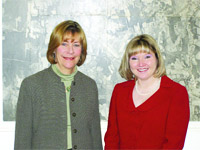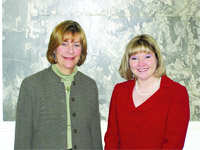
Roller-coaster Ride
Agawam Wants to Balance Commercial Growth with Rural Charm

Deborah Dachos (left, with Mayor Susan Dawson) says the time has come for residents to re-evalute the Tennis Road property.
Agawam is the first colonial settlement in the Pioneer Valley and, from its early beginnings in 1635, has always had a rich agricultural history.
What makes this community of 30,000 residents different from many others in the region is this link to the farms of yesteryear, yet with a suburban presence at the other side of a bridge from the city of Springfield. Like other bedroom communities in the Valley, more than 75% of the towns population commutes out of town.
Mayor Susan Dawson recently told BusinessWest that it is just that balance of the rural and suburban which initially drew her to the town. When I moved here, I came from outside Philadelphia, she said, and I was looking for a suburban community. But I also wasnt really looking for big, because at college in Lancaster County, Pa., I really enjoyed that agricultural side of things.
While many other communities struggle with foreclosures and tax defaults, Dawson said that because Agawam is solidly in the middle of the economic spectrum, her town hasnt been affected to the extent that one reads elsewhere. The median family income hovers around $59,000, and the median sale price of homes from the most recent statistics comes in at just under $200,000.
While Agawam prides itself on that small-town charm, it is also home to one of the regions largest tourist draws: Six Flags New England. Despite a history with that entertainment giant, the town has struggled in recent years for an appropriate balance of its residential and commercial areas, and town officials and residents say the time has come to address this situation again, learning from past divisive issues.
Tennis, Anyone?
Deborah Dachos is the town planner for Agawam, and she likes to look on the bright side of the current economic climate. One thing weve noticed is that the number of applications for new development has significantly decreased over the last year, she said. But that gives me the opportunity to do things I might not normally have the time to do.
What Dachos was specifically referring to is a townwide, comprehensive economic-development survey to address what she, others in Town Hall, and many residents feel is an important, if not the most important, issue: commercial development in Agawam. Sent out to residents via mail, E-mail, and a local newspaper, the survey seeks answers to a variety of questions about retail preferences in the 01001 zip code.
But more importantly, the survey addresses the concerns that townspeople might have with what is known in town as the Tennis Road property, one of the most valuable pieces of undeveloped land bordering Route 57.
Three years ago, an out-of-state developer petitioned to change the zoning on the property to enable commercial, retail construction. A binding referendum question was defeated by a margin of 3 to 1. The prevailing thought from that vote was that Agawam residents do not want a big-box retailer in town, especially one that would negatively impact the smaller residential roads leading to the site and also the high school across the highway.
Dachos said the time has come to re-evaluate that property. We put that question into the survey to revisit Tennis Road, she said. It appeared that, from anecdotal information, people were opposed to someone from the outside. The fear was that some New Yorker was going to come in and circumvent local and state laws, and build something that would be too big for the town.
At the time, she continued, the perception from the referendum vote was that residents said we definitely dont want commercial development on that property. But the survey results arent suggesting that right now. People want new retail development there, but they want very specific things.
Ed Borgatti is the owner of E.B.s, a popular Agawam restaurant, and is also the former president of the Agawam Chamber of Commerce. Remembering that referendum, and the developer whose plans were cut short, he believes it wasnt the right time, nor the right way, to proceed with such a proposal.
The developer who wanted to build out the Tennis Road property a few years back made some serious missteps, he told BusinessWest. He wasnt a bad person; he just went about it the wrong way for Agawam. He was from out of the area, he used PR people and lawyers from Springfield, and basically people in Agawam are not thrilled to feel like the big city is trying to muscle them into decisions.
He should have gotten a consultant from town, Borgatti continued, and he should have hired an Agawam lawyer but as it happened, the town politicians sat down at the meeting, and in come all these guys from Springfield, and that was just the wrong thing to do.
Dachos said that now is the time for the voices of Agawam to decide what they would like for Tennis Road. The residents and the community need to speak up, she said. For the first time, its not a developer from outside the community saying, this is what were going to give you, or this is what youre going to get. It is us saying, OK, do you want something there, and if so, what do you want? So we, as a town, can say to a potential developer that this is what the community says it want, and what it will support.
She noted that there is a developer interested in the property right now, but the administration wants to promote what the community has an interest in.
Big, but Not Too Big
Dave Ratner is the owner of Daves Soda and Pet Food City, one of the stalwarts in the towns local business establishment. After 34 years of successful operations in the community, Ratner knows a thing or two about how things work, and he still finds Agawam a good fit.
Well, one of the things about Agawam that makes it good for a home-grown business, he said, is that when real-estate brokers from chain stores come to town looking to establish a presence, were not on a major highway, so they say, there cant be any kind of marketplace here, and they stay away. And these days, trust me, when youre an independent business owner, thats very good for you.
But Ratner admits that such lack of competition can be too much of a good thing. The flip side to that is, theres more traffic when you do have major, national tenants.
Elaborating on this conundrum, Ratner said that it might not be a bad idea for a few of the bigger players on the national retail scene coming to town wouldnt be a bad idea at all. I think if we got one or two major tenants in Agawam, the whole stock of the town would go up.
Ratner gives a great deal of credit to the town leaders in their efforts to bring successful tenants to the other building abutting his store, formerly housing the now defunct Steve & Barrys. The officials in the town are wonderful to work with. Anything that Ive ever needed, theyve helped with.
It was amazing how much coaxing the town had to do to get Steve & Barrys to come to this plaza, he continued. The brokers came from New York; they drove by here and said, well, this is a terrible location. Its not on Route 5, so they didnt want to open up. But as it turns out, this was one of the best stores for that chain in the region. In little ol Agawam.
Even though much of the towns focus is on the new dirt that could be developed on Tennis Road, many members of the community wonder if such development could revitalize the sagging fortunes of the Agawam Towne Plaza, as reported in these pages recently after the bankruptcy of Steve & Barrys shut down the one anchor store in an otherwise nearly empty plaza.
Both Dawson and Dachos mentioned the lengths to which the town strived to get that retailer into the plaza, hoping that, with such a strong presence, the vacancy signs in the windows would be replaced with new business opportunities. But what makes Tennis Road such a desirable commercial property also makes the Towne Center a more difficult sell. There is a large, vocal group that really wants to see something happen in that plaza, Dachos said. People just cant understand that the buildings are old, the street visibility is not great, and it lacks the highway location.
Roller-coaster Ride
Even though the big-box stores have had a rough road in breaking ground in Agawam, the Six Flags complex has successfully co-existed with the town. Dachos gives that company a gold star for its efforts to be a good neighbor.
Theyve invested a tremendous amount of revenue, several million dollars, in parking lots, pedestrian bridges, and road improvements, to reduce gridlock, she explained. Six Flags has been, from my perspective, a very good neighbor here in town. And it supports a lot of social and civic organizations. The taxes and the jobs are great. We dont hear the complaints that we did when it became a Six Flags facility, where people couldnt get out of their driveway for hours and hours.
Dawson agreed. Someone might think that a giant presence like Six Flags would be an issue for small-town Agawam would be such a giant presence like Six Flags. But that hasnt been the case.
Responding to the recent news of hard times and possible bankruptcy for the nationwide chain, Dawson said that despite the grumblings of impending doom, the companys local operation should be riding the roller coaster A-OK. According to the information Ive gotten from them, they are looking at reorganizing, which simply means that they are going to reorganize their debt. But the services they provide will still be the same. As long as the public doesnt stop going to their entertainment areas, the company will stay sound.
Borgatti, meanwhile, sees the future of his hometown as looking bright. And the word he used to describe this optimism was vision.
Weve always lacked vision in business development in this town, he said. But we are going in a positive direction now.
I think people are afraid that development immediately means that we are going to lose our small-town charm, he continued. But they can live in harmony. Theres always that fear some big developer from out of the area is going to come in and take over for their own benefit. But there are people who grew up here who have a good idea of how to develop and still keep the town spirit intact.
Dachos agreed. Primarily this development interest were seeing right now is home-grown, and the developers who are proposing the subdivisions are local guys who have confidence that things are going to improve, and they want to get ahead of the curve and get their projects approved so that they are ready to go. New restaurants are opening up by local residents who have had dreams for years, and who are now just plowing ahead and doing it.
Dawson weighed in with her final thoughts on the controversial issue of Tennis Road and its future. What Agawam is going to have to do is make some tough decisions about development, she said, because we can have development which means new tax growth, new revenue and it can be clustered so that it doesnt negatively affect our residential areas.
My goal is for affordable senior housing as well as commercial development that people want. Its going to be a win for everyone in town. Well see what happens.





